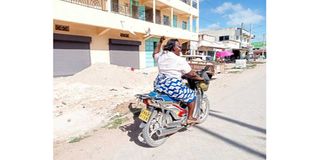Mpeketoni women overcoming taboos a ride at a time

Ms Susan Wamboi Kimani in Mpeketoni town, Lamu County.
What you need to know:
- It’s normal to spot young and old women as well as female pupils skilfully pedal bicycles or ride motorbikes.
- They no longer have to wait for their husbands or boda boda operators to take them to hospitals or attend clinics.
It is around 4.30pm and 50-year-old Susan Wamboi Kimani speedily rides past, on a motorbike, leaving behind a cloud of dust.
Her tactfulness in handling the motorcycle leaves many bystanders amused.
A few minutes later, 32-year-old Mary Wangoi Chege is also spotted pedalling a bicycle with a baby on her back. Welcome to Mpeketoni, a town in Lamu that prides itself on having more women and girls riding motorcycles and bicycles than men and boys.
In Mpeketoni, it is a normal trend to spot either young and old women or female pupils skilfully pedalling bicycles or riding motorbikes, headed to their places of work or school.
Ms Kimani tells Nation.Africa that cycling is a regular means of daily travel for the women in Mpeketoni.
Ms Kimani explains that she started cycling at a young age, and has been riding a bicycle for more than 30 years before she eventually graduated to motorcycling five years ago.
She says for the Mpeketoni woman, bicycles and motorbikes are a treasured asset as it helps them with movement.
“We use these motorbikes and bicycles majorly for transportation purposes. Instead of waiting for our husbands or boda boda riders to ferry us to hospital or our places of work, we opted to teach ourselves the techniques of cycling and mastered it very well,” says Ms Kimani.
The mother of three girls says she ensured all her children learnt how to ride bicycles and motorcycles.
Nduta Njoroge, 38, says as women, they also use bicycles and motorbikes to ferry farm produce to their homes and to marketplaces.
“It has really eased transport. Bicycle and motorbike riding among us, women, has also made our families and marriages remain intact even more. We no longer have to wait for our husbands or boda boda operators to take us to hospitals or attend clinics. We ride by ourselves. There’s no frustration at home nowadays,” says Ms Njoroge.

Lucy Wanyoike, for her part, avers that apart from transportation and other benefits, cycling makes them look good.
“I view myself riding a bicycle as a sense of freedom. It also helps us to lose weight and remain physically fit. Here in Mpeketoni, we’re really good at it,” says Ms Wanyoike.
Reduced transport expenses
Mary Wangoi Chege, a resident of Hongwe village, says bicycle riding has helped her save a fortune in transport costs.
The mother of four says pedalling a bicycle has enabled her to take all her children to the clinic.
“The distance between Hongwe village and Mpeketoni Sub-County Hospital is around six kilometres. It will cost you between Sh150 and Sh200 one way using a boda boda rider. With the poverty levels we face here, one can’t afford. But I am happy. I always use my bicycle to visit the hospital and back at no cost,” Ms Chege tells Nation.Africa.
Margaret Mwikali, a teacher, initially felt awkward riding a bicycle or a motorbike, but later got used to it.
“I feared riding a bicycle or a motorcycle because everybody would just look at me as if I was abnormal. But with time, everyone, including me, got used to it. I use my motorbike to and from school daily. It’s fun and interesting,” says Ms Mwikali.
Julius Kimotho, an activist, notes that bicycle riding by schoolchildren, particularly girls, has helped level the playing field for those who often had to rely on rogue boda boda operators who would later ask for sexual favours.
“Bicycle riding has now reduced the expenses incurred by parents who used to cater for the learners’ fare. The phenomenon of boda boda motorcyclists preying on students who lacked fare was widespread but has now reduced. Cases of early pregnancies have also dropped, all thanks to the girls embracing bicycle riding,” says Mr Kimotho.
Independence
The men in Mpeketoni tell Nation.Africa that they have no problem with female cyclists.

Mary Wangoi Chege in Mpeketoni, Lamu County.
“We’ve allowed our women and girls here to freely ride motorcycles and bicycles. In fact, a woman on a bike reflects her independence. It’s appealing and pretty hot,” says Kamau Mbuthia.
And James Munene says gone are the days when motorcycling or pedalling was predominantly a male activity. “I have ridden with many women and girls here in Mpeketoni on their own bikes. There shouldn’t be any stigma with this. We’re happy seeing our women biking,” says Mr Munene.
Health experts encourage people worldwide to embrace pedalling as it promotes health through physical activity.
Consultant doctor Duncan Chai, of the Bluenile Mkoroshoni Medical Centre in Kilifi County, notes that physical inactivity is one of the leading risk factors for the global mortality and non-communicable disease burden.
“Physical activity should, therefore, be a public health priority. Regular physical activity of moderate intensity like cycling lowers the risk of several chronic diseases such as coronary heart disease, stroke, hypertension, type 2 diabetes, colon and breast cancer, depression, cognitive decline, and even death,” says Dr Chai.





